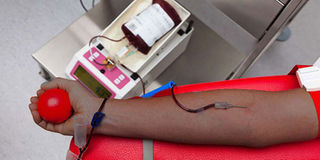Nyeri man dies after opting not to take treatment

A patient undergoes blood transfusion. A man died after declining blood transfusion. PHOTO | FILE | NATION MEDIA GROUP
What you need to know:
- The patient declined to receive the blood on grounds that doctrines of his church do not allow blood transfusion.
- The documents show that the patient made it clear that no transfusion should be done even if doctors believed it would save his life.
A patient died at the Nyeri County Referral Hospital (PGH) after declining blood transfusion allegedly on religious grounds.
Mr Samuel Maina succumbed to kidney complications on Saturday after turning down critical medical procedures because of his religious beliefs, a decision that also left his family in a dilemma.
Documents seen by Nation indicate that the patient was supposed to undergo regular renal dialysis but required urgent blood transfusion.
Mr Gathuku Gachini, the patient’s brother, said that doctors at the referral hospital had advised that Samuel required a blood transfusion before undergoing dialysis.
RELIGION
The patient, however, declined to receive the blood on grounds that doctrines of his church do not allow blood transfusion.
The retired engineer was a member of the Jehovah’s Witnesses who believe that Christians should not accept blood transfusions or donate or store their own blood.
Mr Maina’s decision drew a sharp rift in the family. While some, including his children, agreed with him, his wife and siblings opposed his decision.
They to change his mind arguing the doctrines were irrational and that the procedure was critical for his survival.
“We are Christians too and respect all denominations, but this is wrong,” Mr Gachini said.
LEGAL
Despite multiple counselling sessions and encouragement by his family to reconsider, he refused and doctors, who found themselves in dilemma over his condition, eventually opted to have him sign a legal document declining the medical procedure.
Records show that the patient signed a Power of Attorney declining the procedure, noting he was a member of the denomination.
The documents show that the patient made it clear that no transfusion should be done even if doctors believed it would save his life.
Having signed the documents, the hospital discharged the patient in a move that legally exonerates the facility of blame if the condition worsened.
Despite days of counsel from peers and sections of his family, the patient held on to his decision.



